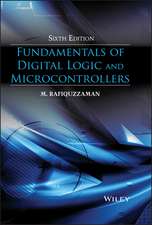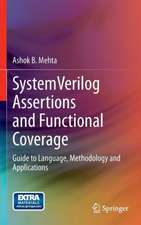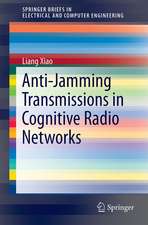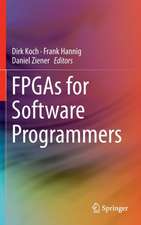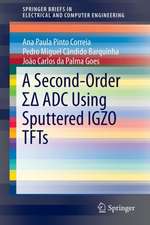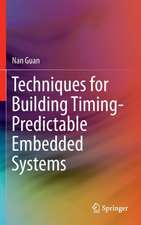Analog Design for CMOS VLSI Systems: The Springer International Series in Engineering and Computer Science, cartea 646
Autor Franco Malobertien Limba Engleză Paperback – 9 dec 2010
The book is primarily intended for use as a graduate-level textbook and for practising engineers. It is expected that the reader should be familiar with the concepts taught in basic introductory courses in analog circuits. Relying on that proper background knowledge the book presents the material on an intuitive basis with a minimum use of mathematical quantitative analysis. Therefore, the insight induced by the book will favour that kind of knowledge gathering required for the design of high-performance analog circuits. The book favours this important process with a number of inserts providing hints or advises on key features of the topic studied.
An interesting peculiarity of the book is the use of numbers. The equations describing the circuit operation are guidelines for the designer. It is important to assess performances in a quantitative way. To achieve this target the book provides a number of examples on computer simulations using Spice. Moreover, in order to acquire the feeling of the technological progress, three different hypothetical technologies are addressed and used.
Detailed examples and the many problems make Analog Design for CMOS VLSI Systems a comprehensive textbook for a graduate-level course on analog circuit design. Moreover, the book will efficiently serve the practical needs of a wide range of circuit design and system design engineers.
| Toate formatele și edițiile | Preț | Express |
|---|---|---|
| Paperback (1) | 1221.38 lei 6-8 săpt. | |
| Springer Us – 9 dec 2010 | 1221.38 lei 6-8 săpt. | |
| Hardback (1) | 1227.52 lei 6-8 săpt. | |
| Springer Us – 31 oct 2001 | 1227.52 lei 6-8 săpt. |
Din seria The Springer International Series in Engineering and Computer Science
- 24%
 Preț: 1041.98 lei
Preț: 1041.98 lei - 20%
 Preț: 643.50 lei
Preț: 643.50 lei - 18%
 Preț: 1225.62 lei
Preț: 1225.62 lei - 18%
 Preț: 965.02 lei
Preț: 965.02 lei - 20%
 Preț: 646.12 lei
Preț: 646.12 lei - 18%
 Preț: 948.79 lei
Preț: 948.79 lei - 20%
 Preț: 646.62 lei
Preț: 646.62 lei - 15%
 Preț: 637.46 lei
Preț: 637.46 lei - 20%
 Preț: 643.83 lei
Preț: 643.83 lei - 18%
 Preț: 949.23 lei
Preț: 949.23 lei - 20%
 Preț: 644.48 lei
Preț: 644.48 lei - 20%
 Preț: 994.92 lei
Preț: 994.92 lei - 20%
 Preț: 645.97 lei
Preț: 645.97 lei - 18%
 Preț: 946.87 lei
Preț: 946.87 lei - 20%
 Preț: 995.57 lei
Preț: 995.57 lei - 18%
 Preț: 956.99 lei
Preț: 956.99 lei - 20%
 Preț: 644.98 lei
Preț: 644.98 lei - 15%
 Preț: 649.54 lei
Preț: 649.54 lei - 18%
 Preț: 950.21 lei
Preț: 950.21 lei - 18%
 Preț: 1221.38 lei
Preț: 1221.38 lei - 18%
 Preț: 957.62 lei
Preț: 957.62 lei - 15%
 Preț: 643.99 lei
Preț: 643.99 lei - 18%
 Preț: 948.47 lei
Preț: 948.47 lei - 18%
 Preț: 947.35 lei
Preț: 947.35 lei - 20%
 Preț: 1284.65 lei
Preț: 1284.65 lei - 20%
 Preț: 1628.31 lei
Preț: 1628.31 lei - 20%
 Preț: 1285.78 lei
Preț: 1285.78 lei
Preț: 1221.38 lei
Preț vechi: 1489.49 lei
-18% Nou
Puncte Express: 1832
Preț estimativ în valută:
233.72€ • 249.92$ • 194.86£
233.72€ • 249.92$ • 194.86£
Carte tipărită la comandă
Livrare economică 18 aprilie-02 mai
Preluare comenzi: 021 569.72.76
Specificații
ISBN-13: 9781441949196
ISBN-10: 1441949194
Pagini: 392
Ilustrații: XIV, 374 p.
Dimensiuni: 155 x 235 x 21 mm
Greutate: 0.55 kg
Ediția:2001
Editura: Springer Us
Colecția Springer
Seria The Springer International Series in Engineering and Computer Science
Locul publicării:New York, NY, United States
ISBN-10: 1441949194
Pagini: 392
Ilustrații: XIV, 374 p.
Dimensiuni: 155 x 235 x 21 mm
Greutate: 0.55 kg
Ediția:2001
Editura: Springer Us
Colecția Springer
Seria The Springer International Series in Engineering and Computer Science
Locul publicării:New York, NY, United States
Public țintă
Professional/practitionerCuprins
The MOS Transistor.- Resistors, Capacitors, Switches.- Basic Building Blocks.- Current and Voltage Sources.- CMOS Operational Amplifiers.- CMOS Comparators.
Textul de pe ultima copertă
Analog Design for CMOS VLSI Systems is a comprehensive text that offers a detailed study of the background principles and the analog design techniques for CMOS-VLSI implementation. The book covers the physical operation and the modelling of MOS transistors. Discusses the key features of integrated passive components and studies basic building blocks and voltage and current references before considering in great details the design of op-amps and comparators.
The book is primarily intended for use as a graduate-level textbook and for practising engineers. It is expected that the reader should be familiar with the concepts taught in basic introductory courses in analog circuits. Relying on that proper background knowledge the book presents the material on an intuitive basis with a minimum use of mathematical quantitative analysis. Therefore, the insight induced by the book will favour that kind of knowledge gathering required for the design of high-performance analog circuits. The book favours this important process with a number of inserts providing hints or advises on key features of the topic studied.
An interesting peculiarity of the book is the use of numbers. The equations describing the circuit operation are guidelines for the designer. It is important to assess performances in a quantitative way. To achieve this target the book provides a number of examples on computer simulations using Spice. Moreover, in order to acquire the feeling of the technological progress, three different hypothetical technologies are addressed and used.
Detailed examples and the many problems make Analog Design for CMOS VLSI Systems a comprehensive textbook for a graduate-level course on analog circuit design. Moreover, the book will efficiently serve the practical needs of a wide range of circuit design and system design engineers.
The book is primarily intended for use as a graduate-level textbook and for practising engineers. It is expected that the reader should be familiar with the concepts taught in basic introductory courses in analog circuits. Relying on that proper background knowledge the book presents the material on an intuitive basis with a minimum use of mathematical quantitative analysis. Therefore, the insight induced by the book will favour that kind of knowledge gathering required for the design of high-performance analog circuits. The book favours this important process with a number of inserts providing hints or advises on key features of the topic studied.
An interesting peculiarity of the book is the use of numbers. The equations describing the circuit operation are guidelines for the designer. It is important to assess performances in a quantitative way. To achieve this target the book provides a number of examples on computer simulations using Spice. Moreover, in order to acquire the feeling of the technological progress, three different hypothetical technologies are addressed and used.
Detailed examples and the many problems make Analog Design for CMOS VLSI Systems a comprehensive textbook for a graduate-level course on analog circuit design. Moreover, the book will efficiently serve the practical needs of a wide range of circuit design and system design engineers.








